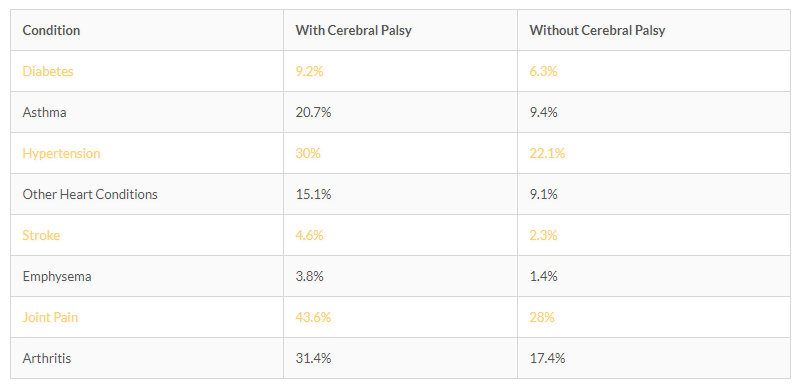In a recent study, the University of Michigan evaluated chronic conditions to determine whether adults with cerebral palsy are at risk for these conditions. Cerebral palsy is a group of disorders that affect the ability to move, and is often caused by events near the time of labor. In an effort to fully understand the effects of cerebral palsy, researchers are examining secondary conditions to see if they are more prevalent among adults with cerebral palsy.
The Cerebral Palsy Study
Published in the Journal of the American Medical Association (JAMA) in December of 2015, the study, Chronic Conditions in Adults with Cerebral Palsy, aims to examine the risk of eight chronic conditions in adults with cerebral palsy. Drawing from 207,615 adults (1,015 who have cerebral palsy), it examined the following conditions, and compared those with and without cerebral palsy:

Importantly, this study adjusted the results for age, sociodemographics, and other factors.
Though the study did not fully explore the reasons for the seemingly across-the-board prevalence, the researchers did speculate that many of these conditions resulted from reduced activity and mobility associated with cerebral palsy.
Why This Matters: Understanding the Effects of Cerebral Palsy
Understanding the full implications of a cerebral palsy diagnosis will help us to better predict and perhaps even prevent these chronic medical conditions. Early diagnosis, treatment, and preventive treatment may slow the arrival of chronic health conditions, and could lead to a longer, better quality of life.
From a legal perspective, it is important to know the full effects of cerebral palsy. Part of every birth trauma litigation involve the creation of a life care plan, which maps out with as much specificity as possible the types of medical treatment, medicines, therapies, equipment and care that a particular person will need for the rest of their life. Knowing that people with cerebral palsy are more predisposed to have other chronic medical conditions, like diabetes and high blood pressure, will allow life care planners to account for the increased treatment and cost often required because of those related medical conditions. Knowing the extent of future medical complications is important so that future life care costs can be addressed before settlement.
Contact Us
A diagnosis of cerebral palsy brings a great number of questions, chief among them the concern about a child’s future quality of life. If you have questions about cerebral palsy, contact us at (440) 252-4399.
